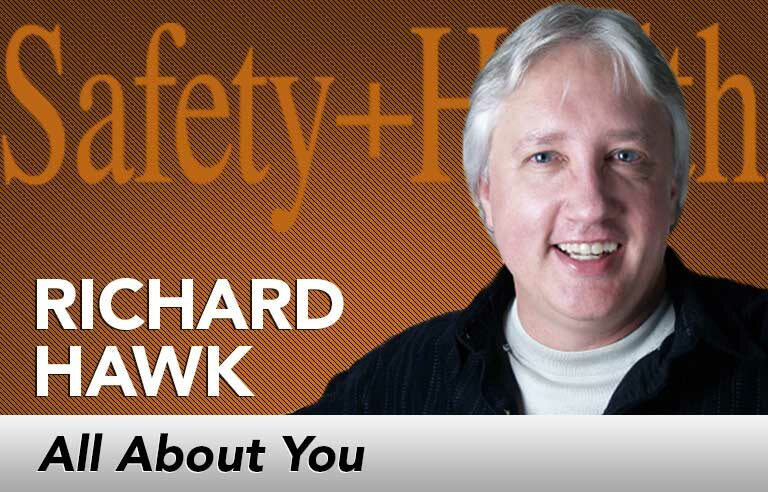All About You: Don’t overthink it

EDITOR’S NOTE: Motivating employees to work safely is part of the safety professional’s job. But who motivates the motivator? In this monthly column, veteran safety pro and professional speaker Richard Hawk offers his entertaining brand of wisdom to inspire safety pros to perform at their best.
You’re in bed tossing and turning, your mind teeming with thoughts about tomorrow’s meeting. You have to give a presentation to a room of senior managers. Tonight is the worst night for you not to get enough sleep, but your mind won’t cooperate.
No matter how hard you try, you can’t stop thinking about the meeting. All kinds of negative thoughts keep arising. “Will I forget an important point?” “What if I get asked a question that I can’t answer?” “If I don’t get some sleep, I’m going to have huge bags under my eyes.”
Sound familiar? Overthinking is something we all do from time to time. I’ve struggled to fall asleep many nights because I was stewing over an upcoming talk or personal problem. Even neutral thoughts, such as what you have to do the next day, can keep you distracted.
I’ve found that it can be helpful to picture what-if scenarios. (See my column about being flexible.) However, if your thoughts won’t stop when you want them to, it can be distressing. Here are some tactics I use when I want to get relief from overthinking:
Recognize what’s going on. Recognizing early on that you’re overthinking can help quell the barrage of needless thoughts, but it’s a skill that needs to be developed.
Once I realize I’m overthinking, I tell myself, “You’re spending too much time on this,” or “You don’t need to think about this now. You’ll have plenty of time while you’re on the plane tomorrow.” The simple act of reassuring yourself can reduce your anxiety and may stop some of your agitating thoughts.
Try not to get angry at yourself. If, for example, your thoughts are keeping you awake, don’t get mad at yourself. I used to do it all the time. If you get angry, you’re sunk – because anger creates a lot of negative energy that will only fuel more thoughts. Remind yourself that you aren’t purposely keeping yourself awake, and try to visualize something you enjoy. I sometimes picture myself walking my dog on a sunny spring day. Although my thoughts may still prevent me from sleeping, my anger is usually gone. Other times, the visualization allows me to fall asleep.
Slow down. If overthinking disturbs you during the day, your body may be sending signals to your brain that stimulate stressful thoughts. Try slowing down. For example, if you’re on your way to inspect a worksite and it’s one of a dozen things on your mind, take note of how fast you’re walking. Reducing your speed for a moment or two and becoming more aware of your surroundings will send signals to your brain that will calm it.
Extensive research on the mind-body connection shows that what your body is doing strongly affects your mind, and vice versa. When you can’t sleep, do a “body scan.” If you detect tension in your shoulders or jaw, purposely relax those parts. In turn, your mind will relax.
Write down your thoughts. This tactic can help relieve your mind from feeling the need to dwell on the thoughts you’ve written down. You certainly can use a keyboard, but I’ve found that writing on paper is more effective. An added benefit: You’ll sometimes come up with solutions to a problem that’s bugging you.
Pay attention to your breathing. A simple way to reduce negative thoughts is to pay attention to your breathing. I include this technique in my stress seminars. Many fellow safety and health professionals who begin using it after attending my seminar tell me how potent this technique is, particularly when they’re anxious or can’t fall asleep. It doesn’t have to be formal meditation – you’re simply paying attention to your breathing. What’s great about this tactic is that you can do it anytime, anywhere.
This article represents the views of the author and should not be construed as a National Safety Council endorsement.
Richard Hawk helps companies around the world create more vibrant safety cultures by showing them how to make safety fun. As a professional speaker, author and musician, he also inspires employees to focus better and enlightens safety leaders about ways to increase their influence. To learn more about Richard, visit makesafetyfun.com.
Direct to your inbox: Sign up to be notified in email about new "All About You" columns.
Listen on Soundcloud or Stitcher
Post a comment to this article
Safety+Health welcomes comments that promote respectful dialogue. Please stay on topic. Comments that contain personal attacks, profanity or abusive language – or those aggressively promoting products or services – will be removed. We reserve the right to determine which comments violate our comment policy. (Anonymous comments are welcome; merely skip the “name” field in the comment box. An email address is required but will not be included with your comment.)

